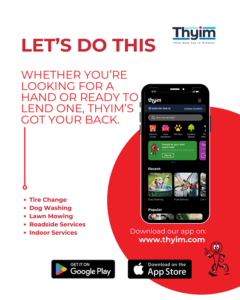The modern gig economy burst onto the scene in 2009, reshaping how people work, earn, and interact. The gig economy with apps like Uber, Lyft, DoorDash and many others have created opportunities for those that were able to create new income opportunities. But as platforms have scaled, so too have the gaps—between workers and fair compensation, between tech and trust, and between help needed and help given.
Now, one startup is setting out to close those gap by taking the gig economy back to its roots: community.
Meet Thyim (pronounced “them”)—a new hyperlocal app that connects neighbors for short, simple tasks using time as currency, not distance or demand-based pricing. Fresh off its launch in Oklahoma City, Thyim is redefining how modern gig work can function—easily, affordably, and equitably—for everyday people. The difference – tasks are accepted and attended to in 15 minutes or less.
A Human-First Alternative in a Scaled-Out Space
The rise of the gig economy has been explosive. As TechBullion previously explored in this deep dive, gig platforms have not only revolutionized employment options, but also introduced a new type of flexibility and entrepreneurship for workers.
However, this evolution has also brought friction: fluctuating pay, limited protections, and platform dynamics that often favor customers or algorithms over the workers themselves.
Thyim aims to flip that script. Instead of optimizing for scale or algorithmic output, Thyim optimizes for people helping people in a model rooted in proximity, shared purpose, and trust. Help is offered in 15, 30, or 60-minute blocks of time at a flat rate, and the relationship between “Helper” and “Pinner” (the person requesting help) is built around simplicity.
Whether it’s lifting a heavy box, assembling a shelf, weeding a garden, or setting up for a small party, Thyim makes it easy to find a nearby Helper who can show up fast—no haggling, no tips, and no stress.
Using Time as a New Currency
What makes Thyim particularly unique is its shift away from a task-based pricing model toward one grounded in time. Traditional platforms tend to assign variable costs based on complexity, geography, or demand. This often introduces hidden fees or pricing inequity—especially for lower-income users.
Thyim, by contrast, offers transparent pricing that reflects time spent, not perceived task value. That means a user can book 30 minutes of help, regardless of the task, knowing exactly what they’ll pay up front. It’s simple, fair, and puts control back in the hands of users and Helpers alike.
This format also lowers the barrier to entry for Helpers, who don’t need specialized skills, licenses, or transportation. Many are simply community members looking to earn extra cash—retirees, students, stay-at-home parents, or anyone with spare time and the willingness to lend a hand.
Reinventing “Work” in the Neighborhood Economy
 Gig work today is often associated with high-effort, low-margin tasks that depend heavily on high-demand urban areas. That leaves many communities underserved.
Gig work today is often associated with high-effort, low-margin tasks that depend heavily on high-demand urban areas. That leaves many communities underserved.
Thyim hopes to change that by making gig work hyperlocal and hyper-relevant. You don’t need to drive across town or optimize your acceptance rate. You just need to live nearby, be available, and show up.
By designing a platform that matches people within a close radius and focuses on smaller, everyday tasks, Thyim builds a new layer of the gig economy that functions more like a community co-op than a delivery fleet.
This is especially meaningful in places like Oklahoma City, where access to help isn’t always a given, and where not everyone owns a car. Thyim’s infrastructure allows people to both give and receive help within walking distance—an important shift from traditional models that often overlook these dynamics.
Building Trust Without Stars
Thyim also ditches the five-star rating system, a staple of gig platforms that has, over time, created inequities, anxiety, and sometimes even bias. Instead, Thyim builds trust through clear expectations, friendly communication, and a mutual agreement that both parties are human beings and not service scores.
It’s a small but powerful change, and it reflects Thyim’s broader design philosophy: to remove shame from asking for help, remove pressure from giving it, and make dignity a built-in feature of every transaction.
Small Tasks, Big Impact
While Thyim’s structure might seem simple—flat-rate pricing, preset time blocks, and a streamlined task list—it’s intentionally designed to address deeper issues in today’s gig landscape:
-
Accessibility: Anyone can use the platform, regardless of background, income, or tech experience.
-
Opportunity: Helpers can earn cash quickly, without long onboarding or complex rules.
-
Belonging: People can ask for help without feeling judged or burdensome.
And the benefits don’t stop at the users. Thyim is already in early conversations with city leaders, nonprofits, and local organizations looking to integrate its model into workforce programs, neighborhood revitalization projects, and even mutual aid initiatives.
A Founder Who Built It Differently
It’s worth mentioning that Thyim’s human-first DNA stems from its creator, R.M. Easterly, a serial entrepreneur and community advocate who’s spent her career helping others launch meaningful ventures. She created Thyim not just as a business, but as a response to the friction, fragmentation, and fatigue she saw in everyday life—and in the gig economy itself.
Her approach wasn’t about scale for scale’s sake. It was about building something useful, usable, and deeply human—and doing it in a way that makes helping feel good again.
The Future of Gig Work Might Be Right Next Door
As the gig economy matures, the next frontier isn’t just about automation or AI, it’s about reconnecting. Thyim shows us what the future of gig work could look like if we put people before platforms, time before transactions, and community before convenience.
And if it works? Thyim might just prove that the most powerful kind of tech isn’t the kind that moves faster—it’s the kind that brings us closer. Thyim is currently available in Oklahoma City and plans to expand to Tulsa in the Spring. Interested Helpers and Pinners needing help, can download the app, available for both iOS and Android.



































